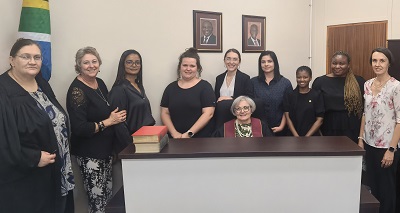Social Work Masters Students Get A Glimpse Of Criminal Court Realities
by Willie du Plessis
A courtroom can be a daunting place ― especially for a child. Young victims of domestic violence and sexual abuse have to deal not only with their trauma but also with court proceedings, cross-examination and giving testimony in an environment that they can perceive as hostile and scary.
This is where social workers in the field of forensic practice make a difference. They not only provide the emotional support and guidance to prepare child victims for the demands of court proceedings, but also serve as expert witnesses in building a strong case against perpetrators.
According to Prof Cornelia Wessels, associate professor and researcher in the Faculty of Health Sciences, the North-West University (NWU) is the only local university offering a Master of Social Work in Forensic Practice.
Six students in this programme had the opportunity to participate in a mock trial in the Postgraduate Social Work Simulation Lab as part of the practical component of their final examinations in November. This gave them their first introduction to what awaits victims and their social workers in navigating the criminal court system.
The mock trial is an annual event. Prof Wessels says since the programme started in 2006 nearly a hundred students benefited from it. “Students do get exposure to the children’s court in civil cases such as determining custody in divorces, but this is their first experience with the criminal court that handles cases such as domestic violence and sexual abuse. In one module for the practical examinations Social Work students must assess a victim and write a report for the court. This is then followed by a mock trial in which students are cross-examined as expert witnesses. This counts towards their final examination.”
Endriëtte Barnard, manager of the NWU’s Law Clinic, presided over the court proceedings. “It was a real enactment of what students in the master’s-degree programme for Forensic Practice can expect in the professional world. For some students it was an eye-opener,” says Prof Wessels.
How did students experience it? “The feedback was very positive. Although we do everything possible to prepare them for the world of work, they often do not know what to expect. Students said they were grateful for the opportunity to first experience it in a safe controlled environment such as the simulation lab.”
Prof Alida Herbst, director of the School of Psychosocial Health on the Potchefstroom Campus, and Prof Retha Bloem, director of the Community Psychosocial Research (COMPRES) research focus area, assisted Prof Wessels and the subject group Social Work with the planning and funding to set up the simulation lab and moot court.
Prof Herbst says the NWU is proud of the initiative and especially of the university’s postgraduate social work programmes. “We offer two structured master’s-degree programmes in the School of Psychosocial Health and COMPRES – the Master of Social Work in Child Protection and the Master of Social Work in Forensic Practice. We believe these programmes equip students for the specific demands of the social work profession.”
…
Prof Cornelia Wessels, associate professor in the Faculty of Health Sciences, says they tried to recreate the court environment. The moot court in the Postgraduate Social Work Simulation Lab is an epitome of the court environment.
…
Students and staff after the practical exams in the moot court. From the left are: Endriëtte Barnard, Prof Alida Herbst, Shanaaz Walters, Driana Zandberg, Jo-Ané Cloete, Marlize Ramsden, Rethabile Tau, Zukiswa Filana and Prof Elmari Deacon. Prof Cornelia Wessels is sitting at the desk.

